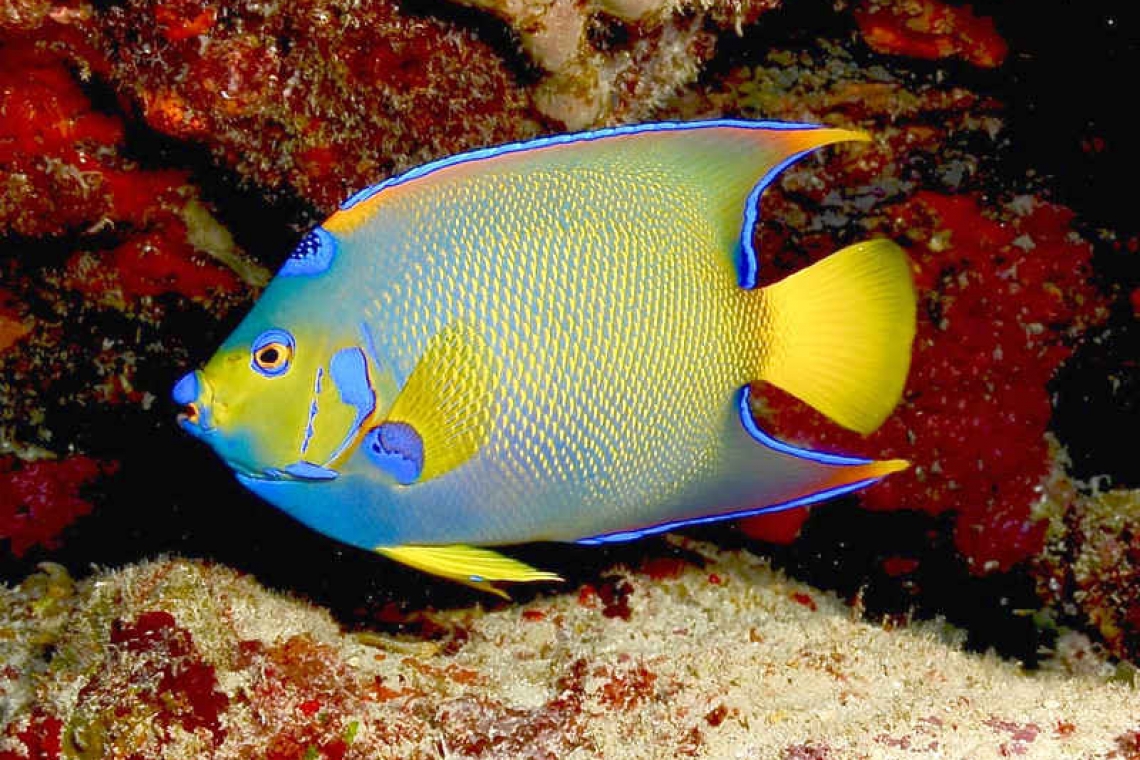A queen angelfish on Proselyte Reef, within the protected Man of War Shoal Marine Park. Park management organisations can now refer to new pandemic response guidelines issued by Dutch Caribbean Nature Alliance. (Leslie Hickerson photo)
PHILIPSBURG/WILLEMSTAD--Dutch Caribbean Nature Alliance (DCNA), the parent organisation of St. Maarten Nature Foundation and its counterparts in the Dutch Caribbean, has released a Pandemic Response Management Letter, it recently announced. This will serve as a blueprint for park management organisations (PMOs) to recognise and respond to, and will protect staff and visitors in protected areas against current – and potential – pandemic outbreaks.
The Management Letter outlines suggested protocols for social distancing, sanitation and other ways to respond to emergency situations related to health emergencies.
“2020 has been an interesting year, with the world facing unprecedented challenges between the effects of climate change and the global pandemic caused by the novel coronavirus and the COVID-19 disease it causes,” DCNA stated in a press release.
“These issues have brought to light the need for a rigorous emergency response plan which PMOs can use in order to safeguard their staff and visitors which may visit the protected areas they manage.”
COVID-19 has been unique in how widespread and devastating the infection has been. The uncertainty surrounding this virus has led to the need for social distancing and minimisation of travel.
This drop in tourism has been difficult, especially for the Dutch Caribbean. Interactions between the public and staff of PMOs vary between the six Dutch Caribbean islands, but risks can be minimised with the implementation of safety protocols and procedures.
The letter will provide each island with the tools needed to properly recognise and respond in emergency situations. Each outbreak will have its own unique set of conditions, so the guidelines provided will need to be tailored appropriately. The key to an effective response is timely acknowledgment of the problem and reacting as swiftly and efficiently as possible.
The objective of creating an emergency response plan is to ensure that these organisations are comfortable recognising issues and reacting appropriately, especially under pressure.
“With pandemics, time is often the most important factor with an immediate response potentially saving lives and limiting the spread of a contagion. The blueprints of a pandemic response can also be useful in a variety of other emergency situations, so having clear, well-thought-out protocols can be an important asset in both current and future emergency response.
“Exchanging knowledge and experiences between the nature parks of the Dutch Caribbean is very valuable and one of the ways DCNA is assisting to strengthen their activities.
“Together as a network PMOs are stronger in the common goal of safeguarding nature. … Lessons learned by the parks have been incorporated in Pandemic Response Management.
“DCNA implores each organisation to take the recommendations into consideration and use them to draft a plan more specific to their situation.
“Pandemic preparedness is not a quick process, as it will require careful planning between all stakeholders and will involve community buy-in. Therefore, it is also important to promote community involvement to optimise local knowledge, expertise, resources and networks,” according to DCNA.
The full report is available via the DCNA website
www.dcnanature.org. For all updates related to nature conservation in the Dutch Caribbean, follow DCNA and its island affiliates via their respective websites and social media accounts.







